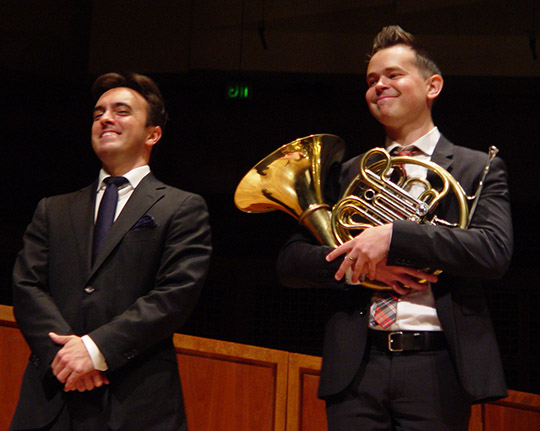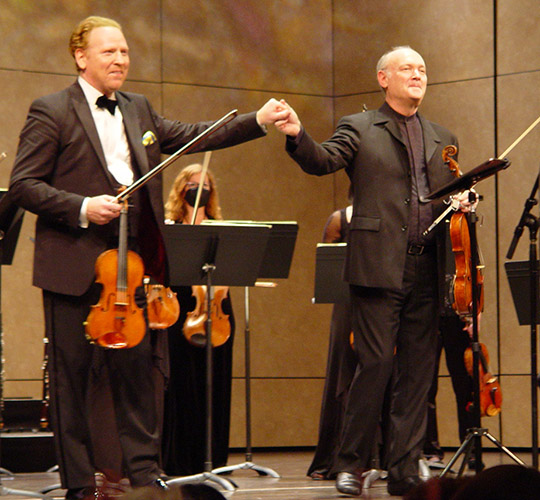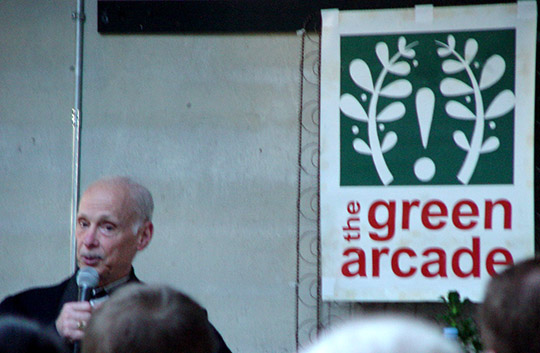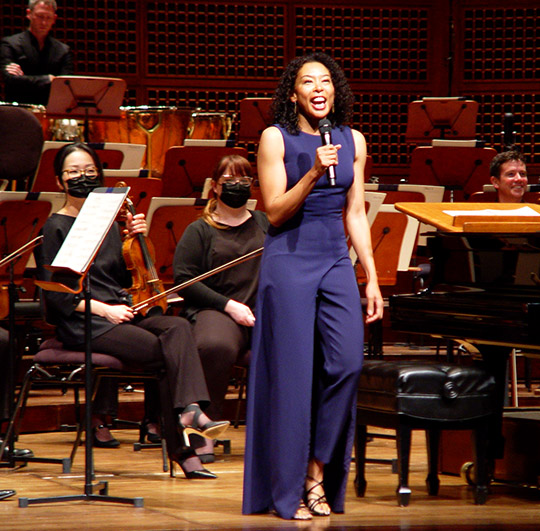The SF Symphony's Chamber Music Series at Davies Hall offered a thoroughly wonderful concert last Sunday afternoon. It started with Jessie Montgomery's 2006 Strum for string quartet and double bass which involved not only strumming but lots of pizzicato plucking, sounding at times like a synthesis of classical Western and rural bluegrass music. The five string players (left to right: Wyatt Underhill, violin; Jessie Fellows, violin; Daniel G. Smith, double bass; Barbara Bogatin, cello; and Katie Kadarauch, viola) seemed to enjoy theselves immensely and were high-fiving each other offstage after they finished.
I rarely go to chamber music concerts at Davies Hall because it is a huge auditorium rather than a "chamber," but I wanted to hear Britten's rarely performed 1954 Canticle III: Still Falls the Rain. The music is set to an Edith Sitwell poem mixing crucifixion imagery with being bombed during the London blitz, and it is one of Britten's best works. It was performed splendidly by tenor Nicholas Phan who described Britten's five Canticles as "art songs on steroids."
The accompanists were exquisite, with John Wilson on piano and Daniel Hawkins on horn. The vocalist and musical instruments are at cross-purposes through most of the work until the final, unison stanza where piano, horn and voice fade into a perfect, ethereal silence.
After intermission, a dozen SF Symphony musicians arrived onstage to play Dvorak's 1878 Serenade in D Minor for Wind Instruments, one of the composer's first successful works in the concert hall. Over the last couple of months, I've heard one disappointing Dvorak performance after another from different ensembles, so expectations were not high, but the 40-minute piece was given an enchanting performance.
Watching the conductorless ensemble play off of each other was a joy, and so was seeing orchestra members who are usually hidden behind the strings, like bassonist Steven Dibner above.
The star of the performance was Jeannie Psomas on clarinet who sounded like a born Bohemian.
Tuesday, May 31, 2022
Sunday, May 29, 2022
Women in Revolt
Walking through San Francisco's Civic Center a couple of Saturdays ago, we stumbled across a Womens March protesting the imminent rollback of abortion rights...
...by the new, radical right-wing majority of the U.S. Supreme Court.
The homemade signage of the marchers was on target...
...and unashamed in its abortion advocacy.
We marched down Market Street with the crowd...
...trapping the occasional, amused motorist.
In the bizarrely prophetic 1985 Margaret Atwood novel, The Handmaid's Tale, various kinds of feminist criminals are strung up in the public square, including gay men who are labeled "Gender Traitors."
At the corner of Fourth and Market, a Christian evangelical preacher was holding forth on a microphone and speaker about how demons had taken over these women and that's why they were so angry.
Fundamentalist religion has a lot to answer for in this country and in the world, principally its centuries-old wars on women.
The 1928 Alice Neel painting above, Well Baby Clinic, of an indigents' maternity ward in New York where Neel gave birth to her first child, is a gruesome depiction of the past that patriarchal reactionaries want to bring back. We cannot let that happen.
The homemade signage of the marchers was on target...
...and unashamed in its abortion advocacy.
We marched down Market Street with the crowd...
...trapping the occasional, amused motorist.
In the bizarrely prophetic 1985 Margaret Atwood novel, The Handmaid's Tale, various kinds of feminist criminals are strung up in the public square, including gay men who are labeled "Gender Traitors."
At the corner of Fourth and Market, a Christian evangelical preacher was holding forth on a microphone and speaker about how demons had taken over these women and that's why they were so angry.
Fundamentalist religion has a lot to answer for in this country and in the world, principally its centuries-old wars on women.
The 1928 Alice Neel painting above, Well Baby Clinic, of an indigents' maternity ward in New York where Neel gave birth to her first child, is a gruesome depiction of the past that patriarchal reactionaries want to bring back. We cannot let that happen.
Thursday, May 19, 2022
New Century Mozart
The New Century Chamber Orchestra performed an all-Mozart program on Saturday at Herbst Theater, starting with the Symphony in B-Flat Major, K. 45B which he wrote at the age of 12 in 1767. The symphony was lost for over a century and discovered early in the 20th. Much of Mozart's juvenalia isn't very distinctive, but this piece was a pleasant surprise, and the ensemble performed it with great spirit.
Music Director and violinist Daniel Hope made a few incisive remarks about the program and introduced Paul Neubauer, his soloist partner for the next work, the 1779 Sinfonia Concertante in E-Flat Major, K. 364 for Violin and Viola. It's a gorgeous work he wrote in Paris just after his beloved mother died while accompanying him, and it stands with Mozart's final three violin concertos as a masterpiece.
Though it is broadcast on classical radio stations frequently, I don't think I have ever seen the work performed live before, which allowed me to finally figure out which instrument was playing what. Hope and Neubauer performed together with an almsot jazz-like freedom, while mirroring, echoing and transforming each other's melodic lines. It was great.
After intermission, the ensemble tackled Mozart's penultimate (one of Hope's favorite words) symphony, No. 40 in G minor K. 550, composed in 1788 just before his early death. The New Century Chamber Orchestra is an all-strings ensemble, but for certain works they feature add-on musical guests, including singers, pianists, percussion, and wind instruments. For this concert, nine freelancers filled out the orchestra on flute, oboe, clarinet, bassoon, and horn. For the most part, they were wonderful, especially Sarah Bonomo and Jonathan Szin on clarinet, but the horns started off-pitch and went in and out of that state for the rest of the concert, which diminished some of the pleasure of the evening.
Though it is broadcast on classical radio stations frequently, I don't think I have ever seen the work performed live before, which allowed me to finally figure out which instrument was playing what. Hope and Neubauer performed together with an almsot jazz-like freedom, while mirroring, echoing and transforming each other's melodic lines. It was great.
After intermission, the ensemble tackled Mozart's penultimate (one of Hope's favorite words) symphony, No. 40 in G minor K. 550, composed in 1788 just before his early death. The New Century Chamber Orchestra is an all-strings ensemble, but for certain works they feature add-on musical guests, including singers, pianists, percussion, and wind instruments. For this concert, nine freelancers filled out the orchestra on flute, oboe, clarinet, bassoon, and horn. For the most part, they were wonderful, especially Sarah Bonomo and Jonathan Szin on clarinet, but the horns started off-pitch and went in and out of that state for the rest of the concert, which diminished some of the pleasure of the evening.
Sunday, May 15, 2022
John Waters Book Signing
Filmmaker, writer, and performance artist John Waters is the Oscar Wilde of my generation. His subversive wit over the course of fifty years of filmmaking, essay writing, and speaking is unparalleled and he shows no signs of slowing down at age 76.
Though Waters has written over a dozen books that are mostly collected essays, three years ago he decided to write his first novel, Liarmouth, which was just published, and he's embarking on a worldwide tour to promote it. Last Monday, the Green Arcade bookstore on Market Street arranged for a book signing and an interview with audience Q&A at the McRoskey Mattress Factory across the street.
Waters was his usual thoughtful and brilliantly funny self without ever falling into repetitive schtick. I remember an interview in an obscure gay rag in the 1970s where he was asked for his favorite joke, and I have been repeating his answer like a mantra for decades. Waters said, "I hate jokes. Whenever somebody tells me one, I immediately reevaluate that relationship." During the audience Q&A session last Monday, I reminded him that he was on a talk show in 2016 where the interviewer asked him, "What was the last thing that shocked you?" and his quick reply was, "Donald Trump being elected President." He remembered the moment and exclaimed, "Oh, gawd, the Trumps. They ruined Bad Taste."
He continued, "Have any of you seen pictures of Barron Trump these days? He's turned into a literal giant. When you see pictures of him with his parents, it looks like that Diane Arbus photo [Jewish Giant with His Parents in the Bronx]."
The line for Liarmouth to be signed with a personal inscription from Waters snaked all the way through the third floor of the warehouse.
Besides all his other projects, Waters started an East Coast Summer Camp six years ago, with cameos by stars of his films like Kathleen Turner, Patty Hearst, and Traci Lords. The three women above had attended the last Camp and were members of the Pussywillows Gang.
This year's fifth interation is taking place in Connecticut, hosted by Debbie Harry, and is already sold out.
Monday was my first wedding anniversary with Austin, who invited Waters to a Halloween party in Baltimore back in the 1990s, and he even showed up. So I asked Waters to write, "Happy Anniversary Buttfuckers Austin + Mike -- John Waters." Now that's a gay wedding anniversary present to remember.
Waters was his usual thoughtful and brilliantly funny self without ever falling into repetitive schtick. I remember an interview in an obscure gay rag in the 1970s where he was asked for his favorite joke, and I have been repeating his answer like a mantra for decades. Waters said, "I hate jokes. Whenever somebody tells me one, I immediately reevaluate that relationship." During the audience Q&A session last Monday, I reminded him that he was on a talk show in 2016 where the interviewer asked him, "What was the last thing that shocked you?" and his quick reply was, "Donald Trump being elected President." He remembered the moment and exclaimed, "Oh, gawd, the Trumps. They ruined Bad Taste."
He continued, "Have any of you seen pictures of Barron Trump these days? He's turned into a literal giant. When you see pictures of him with his parents, it looks like that Diane Arbus photo [Jewish Giant with His Parents in the Bronx]."
The line for Liarmouth to be signed with a personal inscription from Waters snaked all the way through the third floor of the warehouse.
Besides all his other projects, Waters started an East Coast Summer Camp six years ago, with cameos by stars of his films like Kathleen Turner, Patty Hearst, and Traci Lords. The three women above had attended the last Camp and were members of the Pussywillows Gang.
This year's fifth interation is taking place in Connecticut, hosted by Debbie Harry, and is already sold out.
Monday was my first wedding anniversary with Austin, who invited Waters to a Halloween party in Baltimore back in the 1990s, and he even showed up. So I asked Waters to write, "Happy Anniversary Buttfuckers Austin + Mike -- John Waters." Now that's a gay wedding anniversary present to remember.
Tuesday, May 10, 2022
Price and Dvorak at the SF Symphony
Last week's subscription concert at the San Francisco Symphony was disappointing, even though the program looked promising, with two SF Symphony premieres joined by a surpassingly beautiful old chestnut, Dvorak's 9th Symphony, From the New World. Saturday evening started with the composer Nokuthula Ngwenyama's 2020 Primal Message, a ten minute evocation of "the human feeling" behind the interstellar, 186-second radio wave message sent into space in 1974 by Carl Sagan and others. The composer above was in attendance and she was a delight introducing her piece for strings, a harp, and a bit of percussion, but the music itself sounded like an agreeable movie soundtrack rather than a Primal Message. I kept having visions of Jodie Foster and Matthew McConaughey in the 1997 movie Contact.
Florence Price (1887-1953) was an outsider in the American classical music world for the first half of the 20th century by virtue of her gender and race, but she persisted in composing, arranging, and performing music throughout her life, with a few of her works being played by large orchestral institutions. Many of her works not only disappeared from the concert hall after her death, but some of her scores also vanished and are just being physically discovered in old trunks in summer houses. She was the piano soloist in the Chicago premiere of her 1933 Piano Concerto in One Movement, a work that sounds like an interesting mixture of Western Classical music and popular African-American tunes and rhythms. In other words, the music comes from the same time and place as George Gershwin, but from the other side of the color line. The soloist for these performances was composer/pianist Aaron Diehl (click here for his website) and his playing was unusual and exquisite. His encore of a Joplin ragtime piece, Solace (A Mexican Serenade) was soft, slow, ruminative and sounded almost like Philip Glass, one of Diehl's mentors.
At intermission, my concert buddy Austin asked, "With concertos, when the orchestra is drowning out the piano, is that the fault of the composer or the conductor?" My answer: "It depends." In this case, it was definitely the fault of the guest conductor Xian Zhang, currently the Music Director of the New Jersey Symphony.
While visiting Bohemian hosts in Iowa, Dvorak composed his symphony and infused it with African-American and Native American tunes that are both beautiful and carried an important lesson:. "Here, America, this is your music, use it." In 2010, I went to a "Summer in the City" SF Symphony pops concert where Alondra de la Parra conducted "American" music, including Dvorak's Ninth, in a performance so wonderful that I fell in love with the 1893 symphony (click here). My last sentence was snidely woke: "It's nice to see a crack in the door of the Conductors' Boys Club, even though Alondra is still a gender anomaly in our advanced twenty-first century." So it's sad to report that Xian Zhang conducted a terribly mediocre performance of the symphony that was crude, rude and missing any sense of the poetry and felicities that make the work so special. The brass, one of the glories of this orchestra, were too loud and grating throughout, and the conductor didn't seem to have a clue about what makes this music special (Photo above is by Kristen Loken.)
Florence Price (1887-1953) was an outsider in the American classical music world for the first half of the 20th century by virtue of her gender and race, but she persisted in composing, arranging, and performing music throughout her life, with a few of her works being played by large orchestral institutions. Many of her works not only disappeared from the concert hall after her death, but some of her scores also vanished and are just being physically discovered in old trunks in summer houses. She was the piano soloist in the Chicago premiere of her 1933 Piano Concerto in One Movement, a work that sounds like an interesting mixture of Western Classical music and popular African-American tunes and rhythms. In other words, the music comes from the same time and place as George Gershwin, but from the other side of the color line. The soloist for these performances was composer/pianist Aaron Diehl (click here for his website) and his playing was unusual and exquisite. His encore of a Joplin ragtime piece, Solace (A Mexican Serenade) was soft, slow, ruminative and sounded almost like Philip Glass, one of Diehl's mentors.
At intermission, my concert buddy Austin asked, "With concertos, when the orchestra is drowning out the piano, is that the fault of the composer or the conductor?" My answer: "It depends." In this case, it was definitely the fault of the guest conductor Xian Zhang, currently the Music Director of the New Jersey Symphony.
While visiting Bohemian hosts in Iowa, Dvorak composed his symphony and infused it with African-American and Native American tunes that are both beautiful and carried an important lesson:. "Here, America, this is your music, use it." In 2010, I went to a "Summer in the City" SF Symphony pops concert where Alondra de la Parra conducted "American" music, including Dvorak's Ninth, in a performance so wonderful that I fell in love with the 1893 symphony (click here). My last sentence was snidely woke: "It's nice to see a crack in the door of the Conductors' Boys Club, even though Alondra is still a gender anomaly in our advanced twenty-first century." So it's sad to report that Xian Zhang conducted a terribly mediocre performance of the symphony that was crude, rude and missing any sense of the poetry and felicities that make the work so special. The brass, one of the glories of this orchestra, were too loud and grating throughout, and the conductor didn't seem to have a clue about what makes this music special (Photo above is by Kristen Loken.)
Wednesday, May 04, 2022
The Friction Quartet and Sarah Cahill
The Friction Quartet performed with pianist Sarah Cahill at Noe Music Sunday afternoon in a satisfying, wide-ranging program. They started with a work they had commissioned, Max Stoffregen's The Gila: River, Mesa and Mountain. I heard the piece at its premiere with Sarah Cahill at the piano in 2019 at Old First Church (click here), and enjoyed the rambling, atmospheric travelogue that ends with an energetic movement depicting The Mountain. (Pictured above are from left to right: pianist Sarah Cahill, violinist Otis Harriel, violist Mitso Floor, cellist Doug Machiz, and violinist Kevin Rogers.)
The quartet formed in 2011 out of the San Francisco Conservatory of Music, and have been giving amazing performances of contemporary music for the last decade. They seem to be in a transitional period since the departure of longtime violist Taija Werbelow. She was replaced by Lucia Kobza, but then the pandemic arrived, she departed, and it's been a trial finding the right replacement. Subbing in for concerts this spring is Mitso Floor, an SF Conservatory alumni who just finished graduate school at the University of Miami's music school. He was the delightful surprise of the concert, because he's a great musician.
Kevin Rogers introduced one of his favorite pieces of music, Dvorak's 1893 String Quartet in F major "American".
They gave an intense performance that was lively and interesting throughout, though I usually prefer my Dvorak a little gentler.
Performing the audience-friendly Dvorak quartet before the modern music in the second half was a welcome switch from the usual, "and here's something you recognize for the end of this difficult program." Hearing the past made for a richer experience listening to the present. Sarah Cahill introduced Tania León's 2013 Ethos for String Quartet and Piano.
The AND is accurate because instead of being a piano quintet, there is a string quartet playing one set of lyrical and/or slashing music while the piano is doing its own thing altogether in crazy clusters of notes. And then the pauses begin, starting with Doug Machiz on cello (above) and involving everyone in longer bouts of silence. It was absorbing and the right length.
Violinist Otis Harriel gave the best spoken introduction to a piece, Timo Andres's 2012 Piano Quintet. He described how a lot of music is about a journey that is circular, coming home to the original theme, while this music was a true journey, where you were never quite sure where it was going to end up.
He was right, and the performance was expert. What both Sarah Cahill and the Friction Quartet have in common is infusing contemporary compositions with musicality in live performances. It's a rare gift and mission.
Hey, Mitso, here's some unsolicited advice. Keep playing with the Friction Dudes for as long as you can. And for my readers, you can hear the Friction Quartet later this month in Berkeley and Albany and San Francisco. Check out this link for details.
The quartet formed in 2011 out of the San Francisco Conservatory of Music, and have been giving amazing performances of contemporary music for the last decade. They seem to be in a transitional period since the departure of longtime violist Taija Werbelow. She was replaced by Lucia Kobza, but then the pandemic arrived, she departed, and it's been a trial finding the right replacement. Subbing in for concerts this spring is Mitso Floor, an SF Conservatory alumni who just finished graduate school at the University of Miami's music school. He was the delightful surprise of the concert, because he's a great musician.
Kevin Rogers introduced one of his favorite pieces of music, Dvorak's 1893 String Quartet in F major "American".
They gave an intense performance that was lively and interesting throughout, though I usually prefer my Dvorak a little gentler.
Performing the audience-friendly Dvorak quartet before the modern music in the second half was a welcome switch from the usual, "and here's something you recognize for the end of this difficult program." Hearing the past made for a richer experience listening to the present. Sarah Cahill introduced Tania León's 2013 Ethos for String Quartet and Piano.
The AND is accurate because instead of being a piano quintet, there is a string quartet playing one set of lyrical and/or slashing music while the piano is doing its own thing altogether in crazy clusters of notes. And then the pauses begin, starting with Doug Machiz on cello (above) and involving everyone in longer bouts of silence. It was absorbing and the right length.
Violinist Otis Harriel gave the best spoken introduction to a piece, Timo Andres's 2012 Piano Quintet. He described how a lot of music is about a journey that is circular, coming home to the original theme, while this music was a true journey, where you were never quite sure where it was going to end up.
He was right, and the performance was expert. What both Sarah Cahill and the Friction Quartet have in common is infusing contemporary compositions with musicality in live performances. It's a rare gift and mission.
Hey, Mitso, here's some unsolicited advice. Keep playing with the Friction Dudes for as long as you can. And for my readers, you can hear the Friction Quartet later this month in Berkeley and Albany and San Francisco. Check out this link for details.
Subscribe to:
Comments (Atom)









































